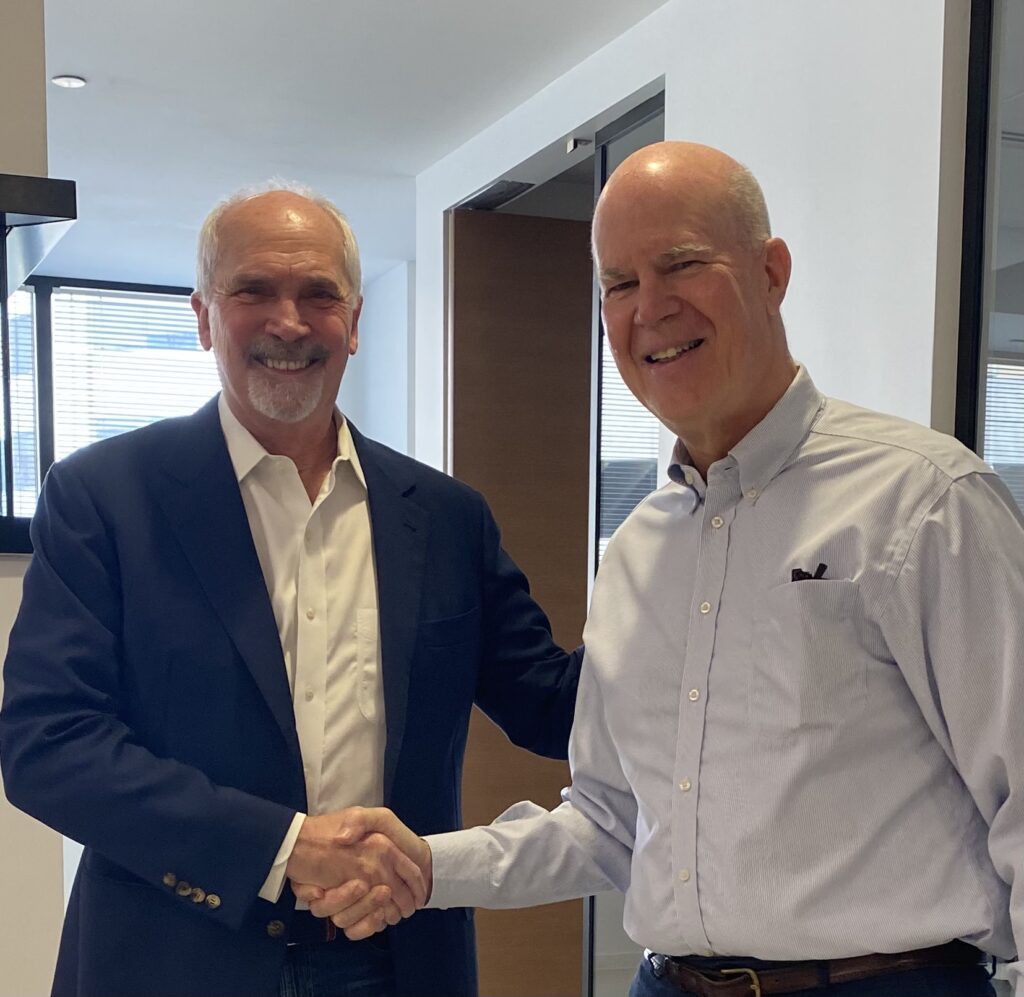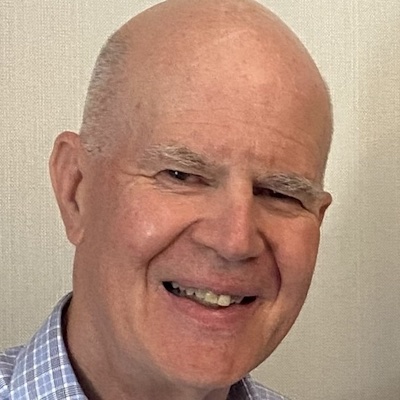Show Notes
 Bob Kettler and John Coe
Bob Kettler and John Coe
Bio
Bob Kettler always had a vision for creating value in Real Estate. He began his career in the early 1970s by renovating apartments, retail stores, and building homes. Although his story began in renovations and home building, he later found passion in developing communities and began laying the foundation of KETTLER, a Real Estate Development Company.
While KETTLER was growing, so too, was Bob’s footprint. He and his wife Charlotte are philanthropic contributors within the community. Currently, Bob serves on the board of the Trust for the National Mall, The Kennedy Center, and Wesley Seminary. He served on the boards for George Mason University, Northern Virginia Community College, the Northern Virginia Building Industry Association, and the National Methodist Church. Additionally, Mr. Kettler served as a Trustee at St. Patrick’s Episcopal Day School in Washington, D.C., and The Potomac School in McLean, VA.
With over 40 years in operations, KETTLER maintains a reputation as a leading developer in the industry and is one of D.C.’s Largest Private Real Estate Companies. Bob is a known trailblazer, thought leader, and frequent speaker. He placed five consecutive years on the Washington Business Journal’s Power 100 list in the last decade and received notable honors like BIA’s Monument Lifetime Achievement Award and the NAHB Developer of the Year award.
Bob continues to oversee KETTLER as Founder and Chief Executive Officer. He and his wife have four children and nine grandchildren and live in the Metro Washington, D.C. Area.
Show Notes
Current Role
- Typically the strategic thinker for the company but not the operations guy- “Management By Exception” (5:40)
- Most projects come from Acquisitions team (6:45)
Origin Story
- His Father, Milton Kettler, was the oldest of three Kettler Brothers, which was the company that was founded in the early 1950s (7:31)
- His Dad was a real estate broker
- Clarence and Charlie Kettler, his uncles built gas stations around the region
- Forlines
- Frank Ewing– Sage man who helped Kettler Brothers financially.
- Kettler Brothers was the largest homebuilder in Maryland (9:45)
- Montgomery Village
- Father thought that the land development business should be separate from homebuilding
- Father passed away when he was young (59 yrs. old) in 1982 (10:45)
- Each of the brothers had their own roles in the company (12:00)
- Uncle Clarence was an “artist” with his home building (12:15)
- Wound down in the late 1980s (12:45)
- Montgomery Village was build in the 1960s through 1980s- Was Mother’s family farm that was assembled
Education & Early Career
- Walt Whitman HS (13:00)
- Univ. of Miami one year
- Took year off to sail to South America for a year
- Attended GWU and AU (14:30)
- Started projects while in college but never finished his degree
- Bought a row house on Calvert St. and remodeled it to a four unit building (15:00)
- Story about a 2nd Deed holder, Mr. and Mrs. Burns to get a woman to sign (16:00)
- Sold it to the Postmaster General
- Borrowed money from Leo Bernstein– National Building and Trust (17:15)
- 9 Lot subdivision on upper 16th Street, NW at Military Rd., NW- 1975-76 (17:45)
- Consulting with Kettler Brothers, but didn’t fit for him to join them and the family was so large that nepotism was not feasible (18:40)
- Father introduced him to a project with Gladstone Associates next to American University and Gladstone could not raise equity, so Kettler Brothers (Bob took it over and started his own enterprise with his brother in law, Scott Paseltiner) (20:15)
- Worked with Whayne Quin of Holland and Knight
Kettler & Scott (First Company)
- Father told him to go to Virginia and meet Til Hazel, who was Milt Peterson‘s partner, who told him to buy all the land you can in Fairfax County between now and 5 yrs. from now at 24 yrs. old (1977) (22:20)
- Weaver Brothers had a site in Centreville, VA and he met the owner, Bernie Steinberg, who was in the steel business (24:00)
- Introduced to his son, Doug Steinberg, who was building with him in new subdivisions
- Lucky that Steinberg was selling him land section by section (eventually became Sully Station subdivision) (26:30)
- Wanted to sell him the whole 650 acre property (27:15)
- Borrowed 100% of capital from Perpetual Savings Bank‘s service company, Sumawheel, to acquire the site (27:40)
- Rick Hausler became partner
- Tom Farasy
- Westfield project to the north with the Henry Long Company (30:15)
- Began Kettler & Scott as a homebuilder, but evolved into land development, as the value (31:20)
- Much higher land values selling land
- Home building must be done at scale (33:30)
- Partnership with Gary Rappaport– Sully Station Shopping Center (34:00)
- Introduced to Stef Tucker– Estate and tax lawyer, who introduced him to Gary (34:40)
- Gary was tenant of Bob
- Discussed Brockbridge Shopping Center in Laurel, MD (35:50)
- Larry Nussdorf quote: “Bob is a visionary. He can take a farm in a location that I would consider in the middle of nowhere and can visualize a fully completed residential development better than anyone I know.” (37:00)
- High regard for Larry (37:40)
- Clark Enterprises relationship- Went to Bob to get back into residential development in the early 1990s (38:30)
- Primarily tax credit apartment projects- 1994-2007 (39:00)
- 35 deals
- All new construction was done with Clark (13 projects together) (40:30)
- B.F. Saul Company relationship (41:45)
- Dwight Schar approached him to form NV Kettler (42:30)
- Potomac Lakes & Cascades was purchased and they merged the parcels calling it Cascades (43:00)
- NV advised him that they couldn’t proceed to buy but went forward with finished lots (44:00)
- Saul Company stepped in to be his partner (44:15)
- 20 Homebuilders
- Brambleton (45:00)
- Cascades- $250MM revolving line of credit (45:50)
- Home Depot
- Cascades Marketplace with GFS Realty (Giant Food)
- Every real estate deal was an equity wipeout in 1990-91 (46:45)
- Banks were failing
Rebranded to KSI
- Apartment development was their startup after the crisis (48:00)
- Also did land development once again
- Deal structure changes (48:40)
- Tax credit business
- Higher equity for land development
- Servicing deals for the Saul Company
Evolved to KETTLER
- Management company now at 20,000 units and had grown to 34,000 units up the East Coast with 9 different software programs (50:45)
- Evolved to reduce its exposure with a strategic plan about three years ago
- Brought in new President- Cindy Fisher (52:00)
- 13,000 units in portfolio now ($6B in value) (52:30)
- Most projects are 300-400 units (53:00)
- Tax Credit portfolio operated differently (53:30)
- Four business lines
- Reduced corporate debt and capitalize projects differently- through high net worth individuals, family offices or institutional investors with long term (54:00)
- Structuring deals with an 80/20 or 90/10 equity joint ventures (55:10)
- Might look at a REIT structure (56:00)
- Selling assets for capital raises (56:15)
Featured Projects
- Sought out by many public companies (57:30)
- Columbia Town Center- Hughes (Kettler built 1,000 units & 70,000 s.f. of retail)
- Tysons Corner Mall- Macerich (VITA) (Kettler did the parking garage and the apartments with a bridge to the Metro station) (1:00:00)
- Square 54- Boston Properties
- Mile Project– PS Business Parks (9 contiguous sites)(59:00)
- The Boro– Pam Tyrell managed that project with 550 units in two different apartment buildings (1:03:30)
- Union Market– Bought sites from Korean families and Doug Jemal (1:04:30)
- Union Heights– Acquired existing project from Clark near Hechinger Mall (550 units) (1:06:00)
- Vyne- One Loudoun (JV with RPAI)- Miller & Smith sold it to them (1:07:45)
- Expansion outside the DMV (1:09:00)
- Ten years ago bought portfolio in Virginia Beach and traded out of there into properties in North Carolina (1:09:40)
- Bought 20 assets in Southeast (1:10:20)
- Building a project in Tampa, FL (1:10:30)
- Project with Disney in Celebration, FL– 350 unit first phase overlooking EPCOT Center (1:11:00)
- Leasing at 40 units/month
- Partnership with Akridge in North Carolina with four projects including land development, apartments and commercial (1:13:00)
- 2008 Downturn- had to rezone and reposition properties over 10 years (1:14:50)
- “Every piece of real estate has its day” (1:15:15)
- “Key to real estate is to don’t die” (1:15:45)
Company Philosophy & Pandemic
- Family business- Two sons and a son in law are employed in the company (1:17:30)
- Long term incentive plans (1:18:20)
- “Most Favored Nation” ownership shares spread among company employees (1:18:30)
- Bonuses and buy-ins to projects (1:19:10)
- Future- Managing Board and Real Estate Company (Sub S Corp.) (1:19:30)
- Management Company value (1:20:30)
- Kettler Ice Plex (1:21:00)
- Brand Value (1:22:00)
- Pleased with his team in all functions (1:22:30)
- Top development teams- sought after by many other developers to join into larger projects (1:22:45)
- Malls- Discussion of Mills Corporation (1::24:00)
- Pandemic impact (1:25:30)
- Accelerated move to suburbs
- Example of Wilmington, NC project being much better than expected (1:26:00)
- Lumber pricing up astronomically (1:27:00)
- Changes view of markets…more suburban perspective (1:27:20)
- Best business activity for 15 years (1:28:00)
- Another 1200 lots in entitlement (1:28:40)
- Moving into Tax Credit business in the early 90s moved the company toward minority and women focus due to that tenant base (1:29:30)
- Diversity evolved naturally and consciously
- Employees spoke 40 different languages
- Richard Hausler was infuential
Influences
- John Neal- Fairfield Homes was a strong influence and a mentor to him (1:32:30)
- Dwight Schar
- Frank Saul
- Til and Bill Hazel- Story about driving for 8 hours looking at jobs (1:34:00)
- Larry Nussdorf and Jim Clark
- Whayne Quin
- Allen Ward– Master Planner for Harvard (1:35:00)
- Brambleton
- The Mile
- Potomac School
- Mission Statement (1:36:50)
- Community and relationships (1:37:15)
- Reston Town Center
- Boro
- Metropolitan Park
- Envision long term projects
- Example from Montgomery Village- residents seeking meaning in their lives (1:38:45)
- Surprising Events
- Reston Town Center in 2001- Terrabrook was a seller and Kettler bid $7MM over the next highest bidder (1:40:00)
- Wanted to get involved in contributing to the community if he could “make a difference” (1:43:30)
- Potomac School project- Fundraising of $50MM with Ted Leonsis and Gene Case (1:44:45)
- 7 years in the capital raise
- Renovation successful
- Potomac School project- Fundraising of $50MM with Ted Leonsis and Gene Case (1:44:45)
- Family and Work fused together (1:46:00)
- 9 grandchildren
- Wesley Foundation
- Appreciate the present more (1:48:00)
- Company has been a reflection of me and an adventure (1:49:00)
- Live your future today- Be here in the present (1:50:00)
Postscript
- Colin Madden talks about Bob Kettler’s passion and vision
- Bob’s environment growing up influenced him
- 1990-91 – S&L Crisis discussion
- Kathy Bonnafe reference
- RTC took over S&L assets
- Reset of valuation offered the largest value
- Sam Zell
- Joe Roberts
- Generalization vs. Specialization
- Bryant Foulger example
- David Flanagan
- Bob Kettler’s recovery was a surprise



